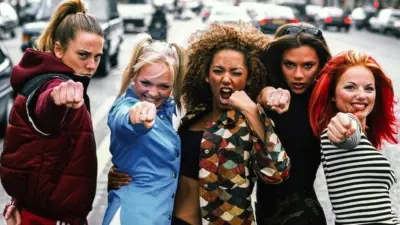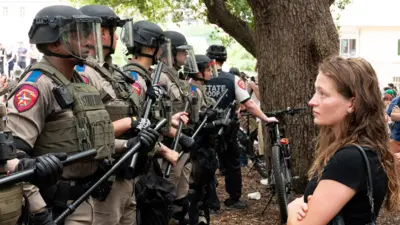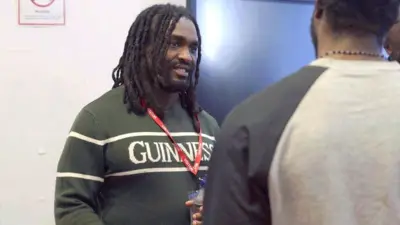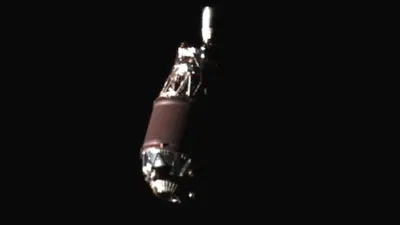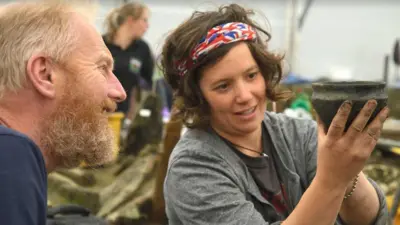We've updated our Privacy and Cookies Policy
We've made some important changes to our Privacy and Cookies Policy and we want you to know what this means for you and your data.
Inside the illegal world of organised dogfighting
- By Tom Symonds
- Home Affairs correspondent
A BBC investigation into the dark world of organised dogfighting discovered an illegal trade of fighting dogs stretching from Eastern Europe to Wales.
The fighters face each other, ready. One rushes forward into a clash of jaws. The ground is already flecked with blood.
The lighter one is winning, locked onto its opponent. The black one has lost the ability to fight back. Now, it simply fights for survival.
Eventually it attempts to walk, but collapses, legs giving way, head hitting the ground.
The fight is over. It dies the next day.
Dogs don't do this naturally, experts say.
They are trained, by men who smile, encourage and place bets, as their animals tear themselves apart.
This is the disturbing world of organised dogfighting.
In 2016 the BBC was briefed exclusively on dogfighting by the British charity, the League Against Cruel Sports (LACS.)
Former police officers had identified key players in an international scene.
"There is still a significant amount going on," says the League's head of investigations Martin Simms. In the last year the organisation has received nearly 100 calls about dogfighting to a confidential hotline it runs.
The charity had evidence that men were breeding, training, buying, selling and betting on fighting dogs - or as they are known in the business, "game dogs".
The LACS investigation, codenamed Operation Bloodline, was aided by the internet.
Animal fighting is an ancient pastime, which, like most subcultures, has now found its place online.
Grand champions
For "dog men" - and it is almost always men - reputation is the currency that matters.
So the merits of particular dogs and breeders are now discussed on Facebook, on specialist closed forums, and - between those involved - on messaging apps.
Sometimes they operate in plain sight, using terminology the average reader might not understand. A dog could be described as a Grand Champion (Gr Ch), a five-times winner or a champion (Ch) with three wins.
They are not talking about Crufts.
Former police detective, Mark Randell, runs Hidden-In-Sight, a private investigations agency specialising in wildlife crime. He led the LACS investigation until 2017.
"'Ch' is used in kennel club circles but in a different context," he said. "'Ch' next to a large muscled dog with a chain and facial injuries will always be dogfighting."
Randell has identified around 70 British people linked with dogfighting.
But the LACS investigators had worked covertly to gather the evidence.
Publishing it would blow their covers. So in 2017 we began our own investigation into the international dogfighting scene, and we picked a promising target.
Ivaylo Nikolov is 37, an intelligent, friendly, English-speaking Bulgarian from the Danube city of Ruse in the north of the country.
Ivo, as we came to know him, is associated with a company that buys, sells and transports dogs around the world.
The Balkans has become the centre of Europe's dogfighting business.
Ivo liked to document his work on Facebook. The League Against Cruel Sports gathered posts suggesting he has travelled to around 29 countries, including the UK, with his dogs.
But among the messages, status posts and check-ins were interesting clues.
One picture suggested the animals he transports are not just family pets
A dog had ripped apart the bars of its travel cage, causing bloody damage in the process.
In other places he occasionally slipped up and used dogfighting terminology.
It was time to find out more about him.
We asked an Italian animal welfare investigator Sylvia (not her real name) to start sending Ivo WhatsApp messages.
She told him she had relatives in a hunting lodge interested in buying a certain type of dog.
One of them was Nik. Older, with an impressive beard, he looked the part.
Nik was from the countryside of Northern Italy, and spoke no English. Sylvia would translate for him in English.
Neither Sylvia nor Nik were experts in match dogs, but behind the scenes a former police officer with decades of experience investigating dogfighting, was also working for the BBC, advising them about the right language to use.
Sylvia sent Ivo a picture of a fake handwritten note from the hunters, a shopping list of dogs they were interested in (with an actual shopping list for food added at the bottom as if she had been short of paper.)
The dogs specified included some for hunting, but also pitbulls, the breed of choice for dog fighting.
The American Pitbull Terrier is almost the only type prepared to fight for long periods. It is banned under Britain's controversial Dangerous Dogs Act.
'A very good dog'
Ivo took the bait. The deal started to develop. The hunting dogs were forgotten as the weeks went on.
Eventually Ivo offered Sylvia and Nik a "very good dog".
"Reliable and ready for match," he wrote in one message. Nik, he said, could "bet good money on him".
The price would be 3,000 euros (approximately £2,698) plus costs. The dog would be supplied by Ivo's contact, a kennel in Moldova, a day's drive from Bulgaria.
By this point we'd learnt a lot about Ivo and his dogs. The international salesman had been keen to demonstrate his credentials.
His WhatsApp messages kept Sylvia and Nik up-to-date on the dogfighting scene.
He sent a video of a match - apparently showing the dogs mentioned in his messages fighting in an undisclosed Eastern European location.
Sylvia received a match report. "One win, in one hour and 17 minutes", read a message. Fights sometimes stretch to two hours.
"Please keep the video very private," he added.
Two weeks later he was planning a trip to the Caribbean where he was expecting to see seven dogfights.
But eventually he sent a fight video including a dog he was offering for sale.
The video is difficult to watch.
By the end the dogs are covered with blood. The watching men hold "break sticks"- used to pull apart the animals - in hands which are also red with blood.
The confrontation is what is known as a "roll" - an informal match sometimes used to prove a dog's willingness to fight.
'True pure love'
Ivo offered to take our undercover investigators to rolls.
"We will have fun in our field," he said.
He appeared to have a genuine love for dogs but also for dogfighting. By now, he believed our investigators shared his feelings.
He said: "It's always very great joy for me when I meet people with such a great desire, and I'm not talking about sales, money or anything else. I'm only talking about the true pure love for the game."
Yet it was partly about money. Ivo was so impressed with the dog he was selling, he wanted to bet on it "when he's ready to match".
What we didn't have was his home address or that of the kennels to which he was connected.
He had been careful not to give away this vital information.
So we began planning to lure him to a meeting. Everything he had suggested was illegal in Bulgaria.
Meanwhile, information from the League Against Cruel Sports led us to valuable sources of intelligence about dogfighting online.
They included specialist websites where owners record the pedigrees of their dogs and sometimes the results of their matches.
They do not use their real identities, instead hiding behind nicknames or the names of their kennels.
Wales link
In 2014 someone using the name The Gameyard posted a picture of a pitbull named Iceboy.
So who was Iceboy, and most importantly, who was The Gameyard?
The clue was in the background of the picture, which we identified from the shapes of distant hills and nearby buildings, as Merthyr Tydfil in South Wales, near the Brecon Beacons.
In fact it was possible to pinpoint the exact location at which the picture was taken - a patch of grass within walking distance of the home of dogfighter Kerry Evans.
He was convicted in 2014 of keeping or training Pit Bull Terriers but not, at that point, sent to prison.
Dogfighting in the UK is a crime which attracts maximum sentences of just six months, handed down by a magistrate rather than being heard in a crown court.
Campaigners say that must change.
We decided to take a closer look at Evans - or rather his dogs - so we started to examine the animal's "bloodline".
The bloodline is a crucial concept in dogfighting. Dogs which perform well in fights are highly valued. Those with tenacity are described as displaying "gameness".
Those who shy away are dismissed as "curs".
A game dog will pass its abilities to its offspring through breeding. And the bloodlines of top dogs are highly valued.
Some become legendary.
One, called Chinaman, was notorious for continuing a fight despite critical injuries. Its bloodline and its name have been passed to countless animals around the world.
On the pedigree websites Iceboy's father, or sire, was listed as "Aspen", a dog bred by "Tomy Kennels".
And who is Tomy Kennels?
Back to our Bulgarian dealer, Ivaylo Nikolov, or as his Facebook profile describes him, Ivaylo Tomy Flyman Nikolov.
Tomy Kennels is directly linked to Ivo.
We have evidence that he provided dogs to Kerry Evans in the UK, possibly to breed from.
A Facebook post showed one of his dogs, named Aspen and listed as a champion, was brought to the UK in 2016. It may have been used to breed a number of British fighting dogs.
By now, our undercover investigators, Sylvia and Nik, were making good progress.
They had arranged to meet Ivo in Bucharest, en route from his home across the Danube in Bulgaria to the kennels in Moldova where the fighting dog we had ordered would be picked up.
The BBC was not about to put 3,000 euros into the pocket of a dogfighter, so the meeting, in a burger restaurant, had to be handled carefully.
Captured by our hidden cameras, Ivo arrived, having battled through rush-hour traffic. The final details of the deal, thrashed out on WhatsApp, were agreed face-to-face.
Moldovan papers
Ivo's Moldovan dog breeder contact was giving them the pick of the litter, he said.
"He gets the best ones and he either goes to match or he calls me and he says 'these are the two or three ones which are the best ones. If you have a good client I may sell, nothing else.'"
Sylvia asked how we would get the dog through customs checks. Transporting a dog for use in fighting is illegal.
Ivo said his contact in Moldova "is actually a state vet in his region" and can issue "any document we want".
But he said, "when you travel with Moldovan papers you have too much checks so I have made Bulgarian documents, also blood tests and export certificates."
Often the exact breed of the dogs are 'fudged' to make it harder for customs officials to detect whether they fall foul of laws such as Britain's Dangerous Dogs Act.
Dog microchips can also be inserted by anyone with the right device.
It was time to confront Ivaylo Nikolov as he left the restaurant.
Apparently stunned at being exposed, he refused to make any comment.
"I don't know you, I don't want to talk to you," he said.
Pursued by a BBC camera crew he attempted to get away. He walked straight past his car parked nearby, perhaps concerned its licence plate might be captured on camera.
In fact we had already identified the plate, which briefly appeared in a video he had previously sent to our undercover investigators.
Nikolov refused to answer any of our questions. But a couple of days later, the Facebook account which he had told our investigators was crucial to what he did, was taken down. YouTube links he had sent, also disappeared.
He hasn't responded to our further attempts to contact him.
A love of dogs
Dogfighting is illegal in most of the world's developed countries.
UK law bans not only fighting, but also owning fighting dogs, training them to fight, trading animals and even filming fights without good reason.
The RSPCA's head of investigations, Mike Butcher, is the country's only expert witness in dogfighting able to give evidence in court.
He is fascinated by the dogfighting criminals he has encountered on raids with the police.
They have "an obsessive love" for dogs, he says.
"We've been to houses before where we've said we're taking your money, your drugs, your gun. They say 'yeah right but you're not having my dog though'. I've seen them attack four or five coppers, or burst into tears."
Yet organised dogfights inevitably result in animal deaths and serious injuries.
The referee usually has no power to stop the fight. Only a fatality or an owner withdrawing their dog brings the cruelty to an end.
The League Against Cruel Sports believes dogfighting is not being properly tackled.
It wants a national register of owners who are banned from owning dogs, a review of the Dangerous Dogs Act and tougher sentences.
Its research raises concerns not just about high-level organised fights, but also the use of dogs by street gangs, either to settle scores through ad-hoc matches or for protection.
Dogfighters are also more likely to be involved in other types of serious crime.
And there is evidence of a low-level group of "wannabe" dogfighters obsessed with the culture of "strong" dogs.
These are dogs who may not take part in matches, but are trained to be aggressive, risking injury to other animals and people.
During our investigation we obtained footage of dogs being kicked or lifted into the air by their jaws, to improve the strength of their bite.
One chilling video from a Northern Ireland dogfighting case showed men shaking a cat out of a tree, so that it could be ripped apart by a dog on the ground.
The charity's further investigations have produced a wider list of possible suspects.
As a result, recently the Scottish Society for the Prevention of Cruelty to Animals raided a house in Dumfries, seizing three dogs.
An animal cruelty investigation has been launched.
As for Ivo, after we confronted him, his social media profiles were taken offline and, sadly, the dog he offered us remains in the world of dogfighting.
Top Stories
Features & Analysis
Most read
Content is not available
